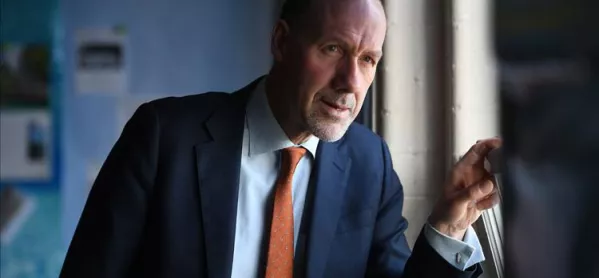- Home
- Political impartiality shouldn’t silence our teachers
Political impartiality shouldn’t silence our teachers

In the opening hours of this already-surreal election campaign, the Association of School and College Leaders issued our 10-point manifesto and urged politicians to embrace positivity. We said:
“Our education system in the UK is highly regarded by other countries. We must stop talking ourselves down. Education has been used as a political football for far too long, with one side denigrating the system in an attempt to disparage the record of the other side”.
I think it’s fair to assume that Nigel Farage didn’t get our memo.
Because, according to the Daily Telegraph, the Brexit Party leader said to an audience this week that children do not support Brexit in large numbers because they are told it is ‘evil’ in schools.
He continued: “I was taught at sixth form ‘here is a problem, here are two solutions, you decide what you think the answer is’ - it is called critical thinking. That is what young people should be taught - taught to think for themselves, to make their own minds up. I fear that through the education system the bias is so much that actually we are teaching young people ‘here’s a problem, here are two solutions, one is virtuous and good and the other is evil’.”
It’s not quite what we had in mind when we said please stop denigrating the system.
Education has also featured in these early stages of the election campaign for other reasons. In a move that we welcomed, the Secretary of State wrote a polite letter to the Association of Electoral Administrators saying he wanted to make sure that “long-planned and important events” in schools at Christmas, such as plays and carol concerts, would not have to be cancelled. He asked - with a tone of utter reasonableness - that the association might seek alternative venues for polling booths.
What he got was a response of astonishing snarkiness. Mr Williamson was accused of a “complete lack of knowledge and understanding”. And, in that tone used by a head of year reprimanding Year 9 pupils for giggling at a guest speaker in assembly, the electoral administrators expressed their “extreme disappointment”.
But all of this is a sign of how education is never far away from the political surface.
After all, in the last general election a survey of 1,000 parents of schoolchildren conducted by YouGov ranked education alongside health and Brexit as the most important election issues. And, of the 43 per cent who named education as a prime issue, four out of five said they were more likely to vote for candidates who would tackle school funding.
Since when - despite recent spending promises of £7.1 billion on schools - the funding crisis across education has unquestionably deepened.
No wonder some politicians might be getting so twitchy about the campaign ahead.
Which may help to explain the appearance this week of new guidance on the Department for Education’s website. Under the heading ‘Pre-election guidance for schools and multi-academy trusts’, the authors issue the following strictures:
- During this period of heightened political activity and sensitivity, you should ensure your school and staff avoid activity that could be construed as partisan or favouring a particular political party.
- You should not use school ICT facilities for the distribution of political material, including that produced by third parties, either within the area of the school site or beyond.
- Local-authority-maintained schools’ delegated budgets are only for any purposes of the school or such purposes as prescribed in regulations. Schools should not use their budget for other purposes.
All of this is, of course, eminently sensible. But is it just me who detects in the tone of the guidance something vaguely threatening, or certainly overly-defensive?
As someone who represents more than 19,000 leaders in schools and colleges across the UK, our view is that of course we shouldn’t be partisan - within the classroom or beyond.
But this is not the same as being gagged from commenting on the realities of education.
If we want an evidence-informed debate about the role of education in our society, then we should feel entitled to serve up the evidence. School leaders should be able to talk to the media about the things they directly experience - the impact of funding constraints, the pressure on the system, and, yes, whether they think the government’s pledges for increased investment go far enough.
They should be able to communicate, factually and objectively, with parents, and they should be able to set out their concerns to candidates. If they are not allowed to do these things - the people who are the sharp end of the system - then how else is the public able to ascertain the facts amid the customary blizzard of political claim and counter-claim.
We would always advocate that this is done in a politically neutral manner, and with the approval and support of governing bodies. But we do not agree that debate should be stifled.
As you would expect of a professional association, we have already issued advice to our members alerting them to the potential pitfalls in a highly-charged political atmosphere and advising caution about any communications. We are acutely aware that candidates and parties may be very quick to construe comments as being political.
But we are determined to work with our members to make sure that the voice of the sector is out there in the general election debate - loud, clear and, of course, strictly impartial.
Keep reading for just £1 per month
You've reached your limit of free articles this month. Subscribe for £1 per month for three months and get:
- Unlimited access to all Tes magazine content
- Exclusive subscriber-only stories
- Award-winning email newsletters



